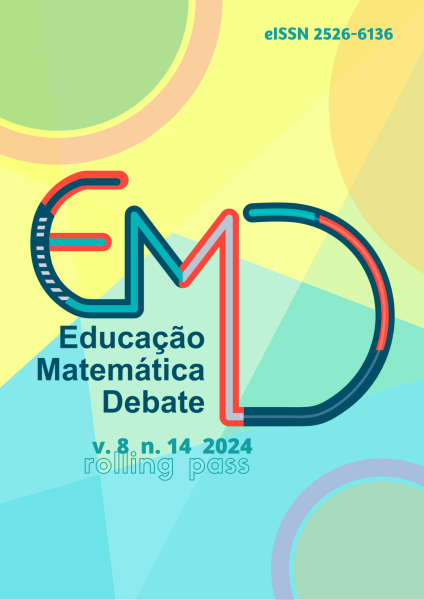Ethnomathematics and Ethnography, an anthropological possibility
DOI:
https://doi.org/10.46551/emd.v8n14a12Keywords:
Ethnomathematics, Ethnography, AnthropologyAbstract
The discussion in this essay highlights the ethnographic approach and its relevance in ethnomathematical research, emphasizing its importance for understanding traditional mathematical knowledge. The concepts of becoming a sorcerer, becoming a mandira and becoming a child, illustrate the dynamic transformation of the researcher in contact with cultural realities permeated by beliefs and myths. These notions show that the relationship between researchers and communities is not limited to observation, but requires a deep immersion that enables the co-construction of knowledge and a broader understanding of cultural identities. These perspectives also contribute to a more inclusive Mathematics Education, valuing the diversity of knowledge and experiences.
Downloads
References
AUDET, Madeleine; PARISSIER, Catherine. La recherche qualitative dans les sciences de la gestion: de la tradition à l'originalité. Recherches Qualitatives, v 32, n. 2, p. 1-12. 2013. https://doi.org/10.7202/1084619ar
BARTON, Bill. Making sense of Ethnomathematics: Ethnomathematics is making sense. Educational Studies in Mathematics, 31, n. 1-2, p. 201-233, sep. 1996. https://doi.org/10.1007/BF00143932
CASTELA, Corine. Ethnomathématique, qu’est-ce que ce mot veut dire?. HAL Open Science [pré-print], p. 1-20, 2020 [HAL Id: hal-03199508].
CLERET, Baptiste. L’ethnographie comme démarche compréhensive: immersion dans les dynamiques consommatoires du rap en France. Recherches Qualitatives, v. 32, n. 2, p. 50-77, 2013.
COPANS, Jean. Introduction à l’ethnologie et à l’anthropologie. Paris: Nathan Université, 1996.
D’AMBROSIO, Ubiratan. General remarks on ethnomathematics. ZDM Mathematical Education, v. 33, n. 3, p. 67-69, jun. 2001a. https://doi.org/10.1007/BF02655696
D’AMBROSIO, Ubiratan. Sociedade, cultura, Matemática e seu ensino. Educação e Pesquisa, v. 31, n. 1, p. 99-120, jan./abr. 2005. https://doi.org/10.1590/S1517-97022005000100008
D’AMBROSIO, Ubiratan. Ethnomathematics. link between traditions and modernity. Rotterdam: Sense Publishers, 2001b.
DELEUZE, Gilles. Spinoza: philosophie pratique. Paris: Les Éditions de Minuit, 1981.
EGLASH, Ron. Anthropological perspectives on ethnomathematics. In: SELIN, Helaine. (Ed.). Mathematics across cultures: the history of Non-Western mathematics. Dordrecht: Kluwer Academis Press, 2000, pp. 13-22.
FAVRET-SAADA, Jeanne. Désorceler. Paris: Éditions de l'Olivier, 2009.
GEERTZ, Clifford. Interpretation of cultures. New York: Basic Books, 1973.
GONDIM, Diego de Matos. O trabalho de campo na/para/com Etnomatemática como possibilidade de uma pesquisa afecção: potências do devir. Bolema, v. 34, n. 68, p. 1077-1104, set./dez. 2020. https://doi.org/10.1590/1980-4415v34n68a12
LAPLANTINE, François. La description ethnographique. Paris: Armand Colin, 2006.
MENDES, Iran Abreu. Reunião de Antropologia da Educação Matemática. In: YouTube, 12 dez. 2024. Disponível em https://www.youtube.com/watch?v=k05N-hE0RsY
RADFORD, Luis. Réflexions sur l’éthnomathématique. In: Actes du 48º Colloque du Groupe de Didactique des Mathématiques du Québec. Ottawa, 2017, p. 168-177.
VANDENDRIESSCHE, Éric. Anthropologie des nombres et Ethnomathématique. L’Homme, n. 225, p. 185-198, 2018. https://doi.org/10.4000/lhomme.30732
ZANGLAN, Agnès Van. Ethnographie. In: SERGE, Paugam. (Ed.). Les 100 mots de la Sociologie. Paris: Presses Universitaires de France, 2019, p. 33-34.
Additional Files
Published
How to Cite
Issue
Section
License

This work is licensed under a Creative Commons Attribution-NonCommercial-ShareAlike 4.0 International License.

















